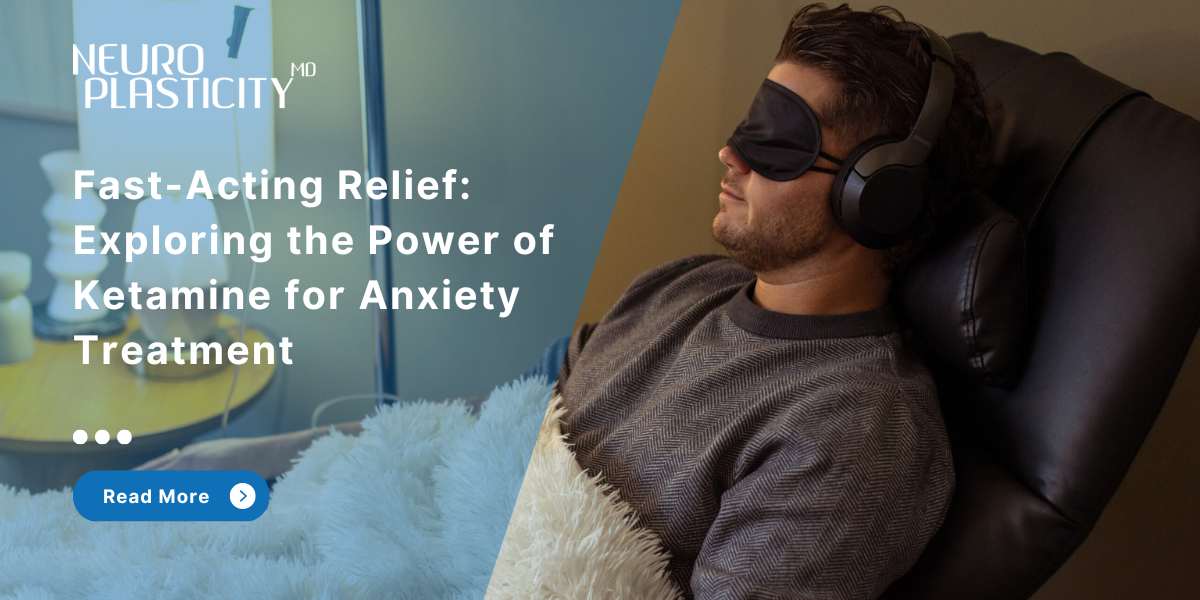Ketamine Treatment for Depression: Fast-Acting Relief & Expert Care For...
Continue Reading
Ketamine, once known primarily as a surgical anesthetic, is now making waves in the world of mental health. As anxiety continues to affect millions across the U.S., many are turning to innovative therapies when conventional treatments fall short. One such emerging option is Ketamine For Anxiety Treatment a promising approach that’s delivering fast relief where traditional medications may take weeks to work.
In this article, we’ll break down how ketamine works, why it’s gaining attention as an anxiety treatment, its safety profile, and what the future may hold for this ground-breaking therapy.
Originally developed in the 1960s as an anesthetic for surgeries, ketamine is classified as a dissociative drug meaning it can temporarily separate a person’s awareness from their environment and body. While this dissociative effect once relegated it to operating rooms or, at times, recreational misuse, scientists have recently uncovered its remarkable impact on the brain’s mood-regulating systems.
Ketamine primarily works by blocking the NMDA receptor, part of the glutamate signalling pathway in the brain. Glutamate plays a vital role in neuroplasticity the brain’s ability to form new connections. This process is critical for learning, memory, and emotional regulation, making it a potential target in mood and anxiety disorders.
Traditionally, ketamine has been used in hospitals to induce and maintain anesthesia, especially in emergency settings due to its rapid action and safety profile. However, more recent clinical trials have shown that low-dose ketamine, administered under medical supervision, can provide rapid relief for conditions like depression and anxiety.
What makes ketamine stand out is the speed of its antidepressant and anti-anxiety effects. Unlike SSRIs or other psychiatric medications that may take weeks to work, ketamine can begin to relieve symptoms in a matter of hours, often after just a single session. For individuals suffering from intense or treatment-resistant anxiety, this can be life-changing.
The key to ketamine’s success in anxiety treatment lies in its unique mechanism of action. By disrupting overactive glutamate transmission and boosting the levels of dopamine and serotonin two critical neurotransmitters in mood regulation ketamine helps recalibrate the brain’s stress response.
Additionally, ketamine fosters neural connectivity through enhanced neuroplasticity. In simpler terms, it helps the brain “reboot” and develop healthier pathways, reducing persistent negative thought loops that are common in anxiety disorders.
Clinical observations and research studies consistently report that patients often feel calmer, more at ease, and emotionally balanced shortly after ketamine infusions. While effects may vary between individuals, some experience a noticeable reduction in anxiety within just a few hours.
This fast-acting nature of ketamine is especially beneficial for those facing acute distress, or for individuals who have not responded to therapy or antidepressants. It offers a critical window of relief that can help patients engage more effectively in talk therapy or other wellness practices.
While generally safe when administered in controlled clinical settings, ketamine is not without side effects. Temporary symptoms may include dizziness, nausea, visual disturbances, or mild hallucinations. These effects usually subside within a few hours after treatment.
A smaller subset of individuals may experience dissociation or discomfort during sessions, but providers are trained to manage these responses and ensure a safe experience.
Ketamine is not recommended for individuals with certain health conditions, including:
Additionally, ketamine is not advised for those who are pregnant or breastfeeding. Prior to initiating treatment, a comprehensive evaluation by a qualified healthcare provider is essential.
While ketamine’s immediate effects on anxiety are impressive, long-term outcomes are still being studied. Some patients may need on-going maintenance infusions, while others experience lasting improvements with fewer sessions. Integrating ketamine with cognitive-behavioural therapy (CBT) or other supportive approaches often improves long-term success.
The field of ketamine therapy is rapidly evolving. Intranasal versions like Spravato (esketamine) have already received FDA approval for treatment-resistant depression, and new oral or sublingual formulations are being developed for ease of use.
Furthermore, on-going clinical trials aim to refine dosing strategies, treatment frequency, and combinations with psychotherapy to maximize benefits while minimizing risks.
In summary, ketamine presents a transformative opportunity for individuals struggling with anxiety especially those who haven’t found relief through conventional treatments. Its fast-acting nature, unique brain mechanisms, and potential for lasting impact make it an exciting frontier in mental health care.
If you’re exploring innovative solutions for anxiety and are located in the Northeast, consider Ketamine Treatment New Jersey through a certified clinic. With expert care and a personalized plan, ketamine could be the breakthrough you’ve been waiting for.
To learn more about ketamine’s potential and to book a free consultation, contact Neuroplasticity MD clinic today.
Ketamine Treatment for Depression: Fast-Acting Relief & Expert Care For...
Continue ReadingA New Look At How Ketamine Treatment Can Help with...
Continue ReadingKetamine Migraine Treatment: A Breakthrough in Lasting Migraine Relief Ketamine...
Continue ReadingDisclaimer: The medical information on this site is provided as an information resource only, and is not to be used or relied on for any diagnostic or treatment purposes. This information is not intended to be patient education, does not create any patient-physician relationship, and should not be used as a substitute for professional diagnosis and treatment. Always consult your healthcare provider before making any healthcare decisions or for guidance about a specific medical condition.